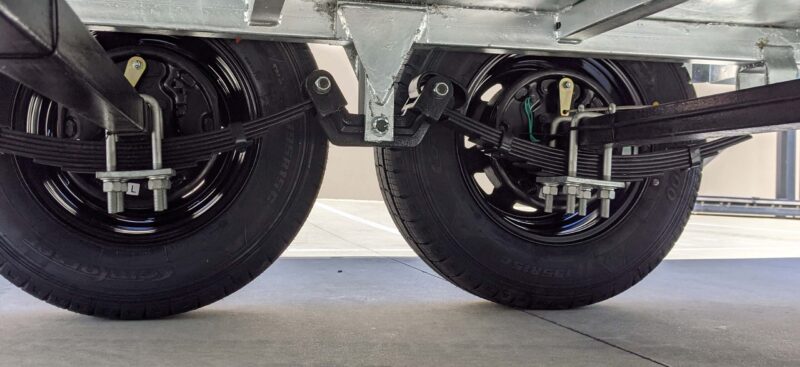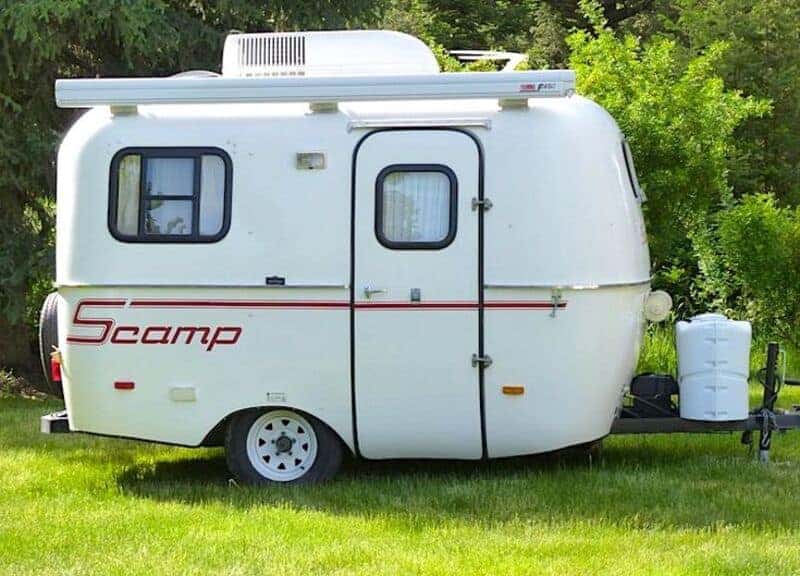Outdoor RV storage, indoor RV storage, the side of your yard, your driveway? There are multiple options to consider when figuring out the best place to store your RV in the off-season.
Traveling is an exhilarating experience but can be exhausting at the same time. For many RVers, the winter is the perfect time to hang up their traveling pants and take a break.
But that break begs the question of what to do with the RV while you’re not using it.
There are several options to consider, but like anything else, they all have their pros and cons.
Many RVers do not have a place to store their RV on their own property. Some also don’t like the idea of outdoor storage for fear of weather-related damage or theft.
This leaves us to explore indoor storage facilities. They provide coverage and more security, which comes at a price, but is it worth it?
We will dive into all aspects of an indoor RV storage facility to help you decide if it’s the right choice for you.
Are There Indoor RV Storage Facilities?
Yes, there are many indoor RV storage facilities to choose from, but indeed, there are still not as many as there are outdoor storage facilities.
This can make indoor facilities a bit trickier to find or may put you having to store your RV a little farther away.
With all indoor storage facilities, not just for RVs, spots can be limited because of the demand and limited space.
Indoor RV storage is becoming more popular as many people have picked up RVing in recent years. With the price of RVs, many are looking to find the best and safest storage for them to ensure their investment is protected and keeps them in tip-top shape for the next season.
Indoor storage offers this protection and is a great option for storage. But be prepared. It can be expensive!
How Much Is Indoor RV Storage?
Indoor RV storage can be somewhat pricey compared to outdoor storage since supply is relatively low and demand is high.
When comparing indoor and outdoor facility prices, sticker shock may occur! Ok, it may not be that dramatic, but there is a definite price difference.
So, why would the cost be significantly more just for indoor storage? Generally speaking, we know that the construction of a building costs a lot more than just a paved parking lot.
Also, most indoor storage facilities are temperature controlled, and they do have to make up the cost of electricity by charging a higher rental price to their customers.
There are also price differences based on the size of your RV. Space is money for storage facilities and the more room you take, generally the more you will pay.
Location (geographically, big city vs. small city, seasonal weather, etc.) is another factor of varying costs to store.
When Mike and Susan of RVBlogger shopped for indoor storage in Maryland the price was over $400 a month!
What Size RVs Can Indoor Storage Facilities Store?

Indoor RV storage facilities likely have accommodations for every size of RV. This of course depends on the individual facility and is an essential first question to ask when inquiring about storing yours.
Most can accommodate full-size Class A’s, which can be pretty large!
Oftentimes, the way the storage facility is set up, the order in which RVs arrive, and the number of RVs already stored are the deciding factors of what length they can accommodate as well.
Once you get a group of RVs into a building, it can become a game of Tetris. This is something to consider when looking at indoor facilities as well.
And when Mike and Susan met with the indoor storage companies, they found that you have to call ahead for them to get your RV out of the indoor storage facility because they are packed in there.
And they learned that the storage facility staff also have to park your vehicle for you, so if you arrive at the storage facility after hours, your RV will be parked outside until business hours when the staff is there.
Is It Bad To Leave Your RV Out All Winter?
Actually, it is okay to leave your RV out all winter. RVs are made to be outside, and most are stored outdoors in the winter by default (dealerships, factories, campgrounds).
If your RV is winterized correctly, keeping it outside unused through the off-season is safe.
While winterizing your camper does keep the RV safer, the weather can still be harsh on seals, tires, and batteries.
Added to that list, in areas where snow is abundant, you also have to consider the damage it can have on a roof. The weight of the snow could cause leaks or other damage.
As an example, Mike from RVBlogger was so worried about snow on his 39-foot motorhome roof he drove to the storage facility to shovel the snow off the roof each time it snowed.
If you do choose outdoor storage, it would be proactive to stop by routinely to make sure everything is properly sealed. You don’t want any surprises when you’re ready to head out on your next adventure!
Where To Find Indoor RV Storage
If you want to find options for indoor RV storage near you, start by doing a quick Google search of “RV storage facilities near me.”
While this may garner some not indoor facilities, you may find that some outdoor facilities offer indoor storage they may not be advertising. They may also be building one in the near future, and you could grab first dibs if you’re lucky.
If the outdoor facilities you contact do not offer indoor storage, this is an excellent opportunity to gather prices for comparison.
Somewhere else to check for indoor storage options would be marine facilities. While not always available, some do offer RV storage. This could give you a greater chance of snagging a spot since many people may not have considered asking a marina.
As always, other great resources to find what you need are campground postings and camping groups. You could discover a well-kept secret that may not be advertised otherwise or even one that offers a discount for referrals.
The RV community is an abundant and far-spreading resource to have at your fingertips.
Mike and Susan ended up finding covered storage instead of indoor starge and they saved quite a bit of money while also keeping their rig under cover and safe. The cost was only $270 a month.
Do I Need Insurance On My RV In Storage?
Keeping or getting insurance on your RV while it is in storage is always a great idea.
While the chances of something happening do seem to be slimmer when you aren’t towing the RV or using it, there is always that chance of something going wrong.
Whether the RV ends up being stored outdoors or indoors, there are scenarios that could put you in a very big financial bind without proper insurance.
Many RV insurance providers offer lower rates for RVs that are just being stored. This could save you enough money to make up the difference of the higher cost for indoor storage, should that be what you choose.
Additionally, many storage facilities require you to carry insurance while it is stored on their property. This is mainly for liability on their part, but it truly helps you in the long run.
We highly recommend calling your insurance agent to ask if your rig is covered while in storage. Some insurance companies require a special policy for stored RVs.
4 Advantages Of Indoor RV Storage
1. Indoor storage can keep your RV safer from big storms and weather in general. Snow sitting on a roof or heavy wind and rain can cause leaks that could go unnoticed until you pick up your RV.
2. Chances of experiencing a theft are significantly lower. Indoor facilities may not be 100 percent secure but in comparison to an outdoor facility, theft is less likely.
3. Climate-controlled facilities reduce the chance of mold. Cold weather itself may not be damaging to your RV (as long as you’re winterized) but moisture is an RV’s worst enemy.
4. You’re less likely to have to deal with coming back to rodents and insects in an indoor facility. Which I believe may just be the biggest perk!
4 Disadvantages Of Indoor RV Storage
1. The price for indoor storage can be a lot steeper than traditional outdoor storage. The cost of the building and power has to be passed along to the renters.
2. You may not have an indoor facility as close to you as you’d like to your house. Indoor facilities are less common so you may have to travel farther to find one.
3. RVs stored indoors can be difficult to access at some facilities. Many large storage facilities have easy access but some smaller places may have to pack the RVs in a little tighter making access tough.
4. The chance of damage due to tight parking especially in smaller facilities is increased. Any good facility will of course cover any damage but it’s not how you want to start your camping season.
Final Thoughts – Indoor RV Storage: Is It Worth It?
Weighing whether indoor RV storage is worth it or not is truly a personal preference.
It is easier to make that personal choice when you have all sides to the story in front of you to make a decision. Protecting your RV from the elements and keeping it safe and secure does come with a cost, however, to many it’s worth it.
For short-term storage, an outdoor storage facility might do the trick. For longer periods of storage, however, indoor storage certainly has its benefits.
If you add in the price of a quality RV cover to store your RV outdoors the cost gap closes a little. Higher-value RVs certainly warranty the high prices of indoor storage more so than a cheap RV but the decision is ultimately yours.
So, there you have it. Indoor RV storage can really be a great option if easily accessible to you and works within your budget!
Related Reading:
– Best Travel Trailer Skirting For Winter
– Is Selling Your RV On Consignment Worth It?
– How To Release A Hitch That’s Stuck On A Ball
– How To Insulate An RV Underbelly
About the Author:
Carley Thompson is a former teacher turned freelance copywriter, stay-at-home mom, and full-time RVer from southern Ohio. She has been traveling the country on and off for the last decade, letting the road be led by her husband Stevens Union welding career.
Four years ago they decided to sell their house and take their two young girls, Harper and Ensley, on the road full-time. Since then, Carley and her family have visited 26 states with no plans of stopping. She loves homeschooling her girls on the road, giving them unlimited opportunities for hands-on learning.
She also enjoys hiking, spending time on any body of water, and meeting new and old friends on the road. Traveling full-time as a family has always been her dream, and she is loving it!




